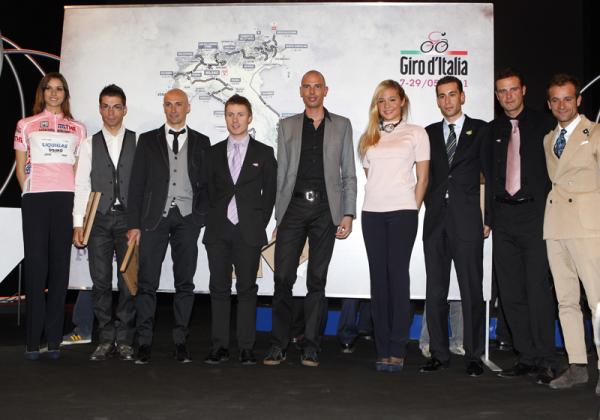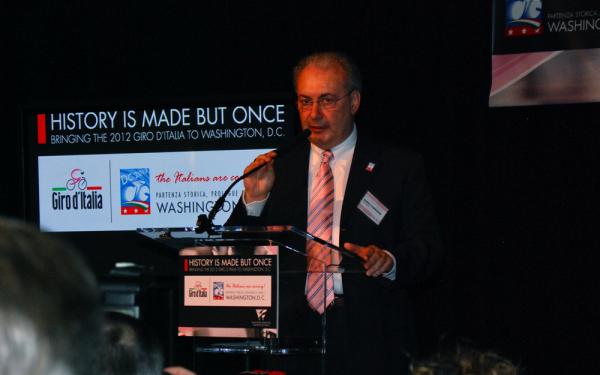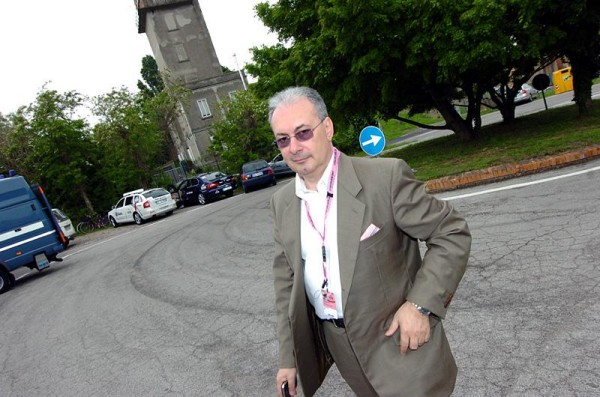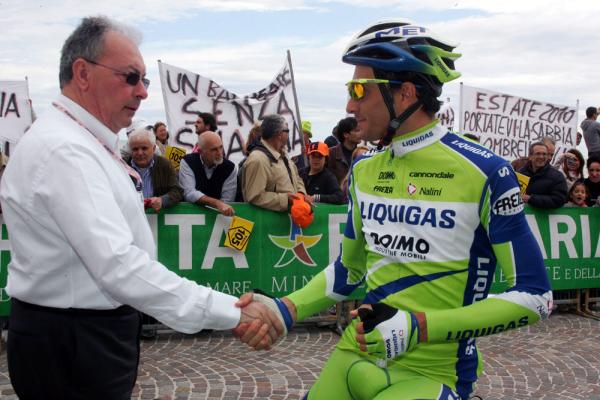Giro d'Italia 2011: "It's a hard Giro but the Giro has to be hard"
An exclusive interview with race director Angelo Zomegnan




The director of the Giro d'Italia Angelo Zomegnan is like a proud father and doesn't like anyone criticising his race, especially on the day of the presentation of the route for 2011.
Zomegnan has been in charge of the Giro since 2006 and has transformed the sport's second biggest stage race, forcing the Tour de France to be more adventurous and creative to avoid being outclassed. The former Gazzetta dello Sport cycling reporter is not afraid of pushing the limit of the sport and plans for the 2012 Giro to start in Washington DC are still on the table.
The route of the 2011 Giro celebrates the 150th anniversary of the unification of Italy and follows a traditional route, starting in Turin and finishing in Milan. It will be remembered as one of the most mountainous routes for years. There are 40 major climbs during the race and seven mountain finishes, including on the Etna Volcano in Sicily, on the steep climb up Monte Zoncolan and on the unmade roads of the Colle delle Finestre.
Zomegnan admits he and his experienced team have created a hard route but refutes any claims that the Giro is now too hard for riders to target both the Giro and the Tour de France in the same season.
"It's a hard Giro but the Giro has to be hard, it has to be difficult," he argues in an exclusive interview with Cyclingnews.
"These days there's never a boring stage during the Giro d'Italia but that's the way the Giro has to be. If the riders want an easy race, with no climbs, no descents, no rain or wind, they should go elsewhere in May. There's no such thing as a descent that is too difficult or a climb too steep.
"We like to do the things that nobody else has the courage to do. If you copy some else, you're always one step behind. We like to be one step ahead."
Get The Leadout Newsletter
The latest race content, interviews, features, reviews and expert buying guides, direct to your inbox!
To celebrate the unification of Italy, the Giro will visit 17 different regions of the country, touching Sicily in the very south before returning north for the final ten days in the mountains.
"The 2011 Giro will celebrate the unification of Italy. During every stage there's something that will remind people of an event or special moment in the history of the unification of Italy. It's going to be a special Giro," Zomegnan explains.
"The start in is Turin because it was the first capital of Italy in 1861. Then there's a stage start in the little port of Quarto dei Mille where Giuseppe Garibaldi set off for his journey south to start the unification of Italy, there's a start in Reggio Emilia, where the Italian flag was first shown. Messina is the birthplace of Vincenzo Nibali but most of all it is a city that recovered from one of the worst ever earthquakes to hit Italy. And we climb Etna twice during the same stage. Unlike the Ventoux, Etna is a live volcano and has a unique terrain. If Etna decides to explodes, we're in trouble…"
"There are other stages in Castelfidardo, where an important battle was held and Ravenna, that is a historic town. There's a stage into Austria because Italy separated its self from Austrian rule and the race will visit the battle grounds of the first world war near the Marmolada. Wars are terrible things but it's important to never forget. A country builds its future based on its memories of the past."
"The Zoncolan is back again in 2011 because it attracted a huge crowd both at the finish and around the world on television. I like the big name climbs to decide the race and so they're all in the right place to inspire great racing. That's why we've also got seven mountain finishes and why the last big climb is the Colle delle Finestre near Sestriere, before the final time trial to Milan."
Selecting the teams
Like Tour de France director Christian Prudhomme at the Tour de France presentation, Zomegnan is unable to say which teams will be on the start line in Turin on May 7 because the major race organisers and are still negotiating with the UCI about the protocol for team selection in 2011.
He insists that no deal was reached with the UCI during the world championships in Australia and stands firm against the idea that the 18 teams given a ProTour licence for 2011 will have an automatic invitation to the Giro.
The Giro d'Italia always faces an uphill task to have a high-quality international field because many riders opt to target just the Tour de France. The UCI wants to guarantee places in the big races to the biggest ProTour teams, but Zomegnan fiercely defends the sovereignty of his race and wants the final word on which teams and which riders are allowed to ride the Giro, especially riders who have come back from a doping ban.
In the past Zomegnan has not been satisfied with the strength of some teams in the Giro and hints that a Saxo Bank team without Alberto Contador or Richie Porte would not deserve a place in the Giro peloton.
Basso, Nibali, Ricco and Di Luca
2010 Giro winner Ivan Basso was not at the Giro presentation because he had previously agreed to ride a criterium in Mexico when the presentation was scheduled for October 30.
Basso is considering targeting the Tour de France in 2011 but Zomegnan hopes he will also ride the Giro.
"He's already won the Giro twice and so he's got a moral obligation to try and win a Tour, especially with the 2011 Tour route suiting him so well," Zomegnan said.
"It's up to his team to choose. I think the tifosi want to see the previous year's winner at the Giro and if he doesn't win himself, he could help Nibali win."
The fight for the 2011 pink jersey looks set to be a largely Italian affair, with perhaps only Carlos Sastre the nig-name foreign rider with the ability to challenge on the tough course.
Riccardo Ricco seems to have served his 'quarantine' after being snubbed this year immediately after completing his ban for doping comeback. However, Zomegnan makes it clear that Danilo Di Luca should not build up his hopes of riding the 2011 Giro d'Italia.
"Perhaps the evidence Di Luca gave to the police was significant but we'll see," Zomegnan says. "But he knows he's going to get a punch in the stomach and sooner or later he'll get it. He was caught while he was winning the Giro d'Italia and we can't forget that.
"Di Luca is hoping to find a place in a ProTour team but ethics is one of the key requirements of every team's ProTour application. If the UCI gives a licence to teams that have riders who aren't ethically up to scratch, we'll see what we can do.
"It's hard for us because the rules aren't clear and they're changed too often. If you draw up as rule and then need three experts to decide how it works, that makes things messy.
"It's the same with the UCI's biological passports. For example if Pellizotti is cleared even on appeal to Court of Arbitration for Sport, Where does that leave the passport?
"The anti-doping programme costs 8.5 million Euro a season. That's a hell of a lot of money.”
Washington DC in 2012?
Zomegnan insists there still a strong possibility that the 2012 Giro will start in Washington DC, but warns time is running out on a final decision.
"We've got another conference call on October 28. It’s a difficult and complicated project that we're still working on and we're not yet sure if it will happen. We hope so because it would be amazing," he said.
"There's a no specific deadline for a decision but the process can't go on and on until even January next year. We've got a lot of cities that want the Giro start in the next few years and we need to make some long-term decisions. The sooner everything is decided one way or another, it will make easer to organise things."
"When we unveil one Giro, we're already working hard on the next one and the one after that. The Giro is a race that never stops.”

Stephen is one of the most experienced member of the Cyclingnews team, having reported on professional cycling since 1994. He has been Head of News at Cyclingnews since 2022, before which he held the position of European editor since 2012 and previously worked for Reuters, Shift Active Media, and CyclingWeekly, among other publications.